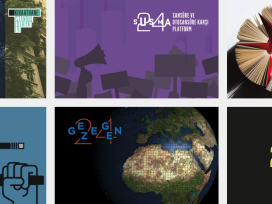On 23 September 2008, the journalist Ognyan Stefanov was beaten almost to death by a group of unknown assailants. The Bulgarian state expressed its anger at this attempt to destabilize its authority and vowed to put strict measures in place without specifying what those measures would be. To this day, they remain unidentified, as do the assailants who carried out the attack. The only fact known with certainty is that Ognyan Stefanov has begun a long and difficult recovery. After waking from a coma, he is now undergoing a series of operations on his shattered arms and legs.
A number of transparently clear conclusions can be drawn. First, the unknown assailants remain unknown not because the authorities do not suspect who they are. Second, the only reason why someone might want to beat a journalist so ferociously and so blatantly would be because of something he or she had published. Third, if the state feels threatened by destabilization as a result of criminal activities, then it is evidently subordinate to criminal influence. Four, it is precisely for this reason that the “strict measures” of the state are limited to threats against unidentified offenders.
Despite these banal realities of Bulgarian everyday life, the beating of a journalist is no ordinary crime. It is a message addressed not so much to the victim, whoever his publications might have offended, as to the journalistic profession in general, whose prime role is to be the guardian of the right to information. Its aim is to keep society at large unaware of what is happening in the state’s complex equation of unknowns. Were society to be made aware of the precise nature of the state it is governed by, the next legitimate question would be: “What do I need it for?”
Last September, while the state was celebrating a century of independence, the criminal underworld raised its head to remind the authorities who was in charge. Celebratory speeches echoed with hollow rhetoric; historical facts were grotesquely summoned to support the false pride of modern Bulgaria. Even during the years of its greatest national disasters, the state never fell so low as to flirt with criminal structures. Now, as part of a united Europe, it has to put up with the shame of being singled out every six months in the reports of the European Commission as a breeding ground for organized crime and all-pervasive corruption.
What is also shameful is that all the political parties lined up one after another in an outpouring of indignation against the unknown assailants. Shameful since they themselves are responsible for the current condition of the state, its laws and their application. Journalists have no need of the false compassion of politicians: it was due to the persistent efforts of the ruling class of all political hues during the years of post-socialist democracy that one of the country’s most restrictive laws was passed against them. Until the end of the 1990s, Bulgaria led the field in the number of court cases against journalists. When this state of affairs came to light in the Council of Europe, the Bulgarian state was persuaded to remove prison terms as a sanction for journalistic publications, only to replace them with colossal fines.
Anyone who might have been troubled by Ognyan Stefanov’s case could quite easily have made use of the convenience of state mechanisms to bring the case to court. The beating, however, only goes to prove that the criminal world takes no heed of the state and pursues its affairs without hesitation and without regard for the existence of the state. The state does not scare them, nor do they need it to impose their own order. A number of spurious figures roam the highest echelons of power, posing immodestly in their statist roles. At the same time, violent assailants, who may never have read a newspaper in their lives, demonstratively impose their own authority on behalf of certain persons sensitive to caustic publications.
Today journalists are beaten; tomorrow they may be shot at and there is no one to stop the assailants. The result of this will be self-censorship. Civil society, to the extent that it exists, will collapse into its basic social cells and lament its condition in private behind well-locked doors. The monster created by the ruling caste for its personal enrichment will roam with impunity; the time will come when even the rulers will no longer dare show their faces for fear of the real or imagined threat.
The media in Bulgaria have no other defence against criminality than its public exposure. Criminality is vulnerable to this since it is, per se, illegal and endeavours to remain in the dark. However, it is more difficult for the media to defend themselves from the authorities, which serve criminality by harnessing it in the reins of “legality”. In an effort to avoid state interference in the form of special legislation, the media have in recent years developed an effective system of self-regulation.
In 2004, the Code of Ethics for the Bulgarian media was passed after more than 200 draft versions had been discussed. This led to the formation of two distinct media sectors, one of which endeavours to work according to the principles of high-quality journalism, while the other is guided principally by its own judgment of what is right and wrong. The most valuable aspect of this process is the emergence of a distinction between “serious” and “tabloid” journalism. This is a distinction between serious journalism standing on its reputation as fulfilling the social function as a “fourth estate” and a journalism whose sole purpose is entertainment.
In the media, as in other areas of the emerging Bulgarian democracy, European principles would not have been adopted without external pressure. The “tabloidization” of journalism in the dawn of the market economy was indicative of the initial chaos of the transition and its inability to separate the grain from the chaff in models copied from other countries. Given the lack of an undisputed authority to provide guidelines distinguishing between serious and tabloid journalism, the results of initial efforts by individual media and the Union of Bulgarian Journalists to impose ethical standards were weak. The necessary authority was found in the European Union. The EU Phare programme financed a project entitled, “Technical support for the improvement of professional standards in Bulgarian journalism”. The project was supported by the BBC World Service Trust, the charitable arm of the British Broadcasting Corporation. However the model code of ethics proposed by the BBC was too rigorous for the Bulgarian realities of the time and ran the risk of being rejected by the daily newspapers with the highest circulation. As a result, some of the standards in the code were eased until such time as the newspapers themselves were ready to raise their own standards.
The lack of any serious objections to the text of the code showed that Bulgarian journalists were already favourably inclined towards the observation of the basic principles of professional ethics, whether written or not. Their codification increases journalists’ sense of belonging to a professional association and of collective responsibility. Its benefits are evident: there has been a reduction in the will to sue the media and, though there have been dozens of complaints against press in the past two years, these have been settled out of court through the arbitration of the ethical commission. Moreover, it is worth noting that the majority of the court cases are against media from the tabloid sector, which does not recognize the code of ethics. Not only are they more inclined to breach professional standards without particular qualms, they cannot count on the solidarity of the Union of Journalists.
Insofar as it is the dream of every government to control journalists via the law, self-regulation is the strongest argument against any attempt at state regulation. The last such attempt in Bulgaria was in February 2007 when Volen Siderov, the leader of the nationalist party Ataka, proposed the drafting of a media law after he had been offended by an article in the weekly 168 Chasa. It alleged that his party had been secretly financed by the ethnic Turkish party, the MRF (Movement for Rights and Freedom). Even though there was no specific evidence that Ataka had been receiving funding from MRF, Siderov responded with an idea borrowed from the ideological treasury of the Turkish party, namley a proposal to “sort all this out” by regulating the press.
For historical reasons, such an attitude towards the press seems appropriate to the Turkish party: the first law on the press in Bulgaria was passed in 1864 by the Ottoman government before Bulgaria’s liberation. The first clause of the law stated that “A newspaper or other sheets may not be promulgated without permission”. From that moment until 1947 Bulgaria enacted a dozen or so laws on the media. After that date they became superfluous. However, this incident showed that the problem is not related to ethnicity, since any party or any government would restrict the freedom of the press if it had the opportunity.
Responsible behaviour through the self-regulation of the media is, for the moment, the best defence against intervention by the state; whatever claims might be made about its efficacy, its benefits cannot be denied. Siderov’s proposals met with no support, not because he had no like-minded supporters in parliament, but because the media had strong counter-arguments and were able to organize collective opposition. It is significant that the electronic media displayed solidarity with the printed press and enabled it to address its defence to the widest possible readership. The common denominator in this case was professional ethics and the solidarity that comes from joining a common cause. The development of these two factors was due in no small part to the Code of Ethics of the Bulgarian Media that governs both the printed and electronic media.






